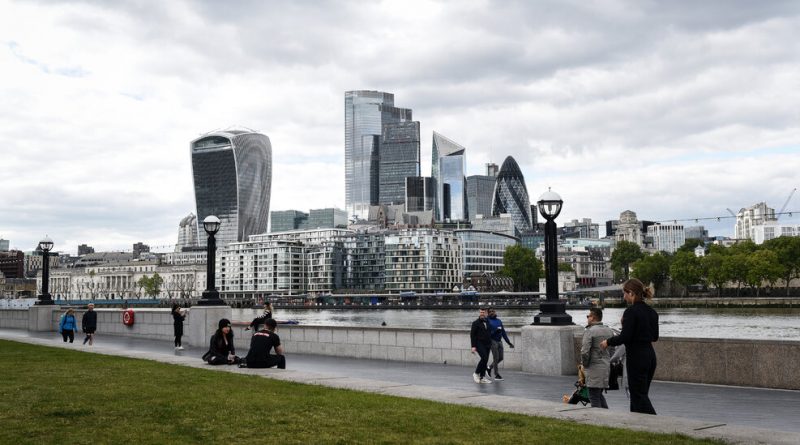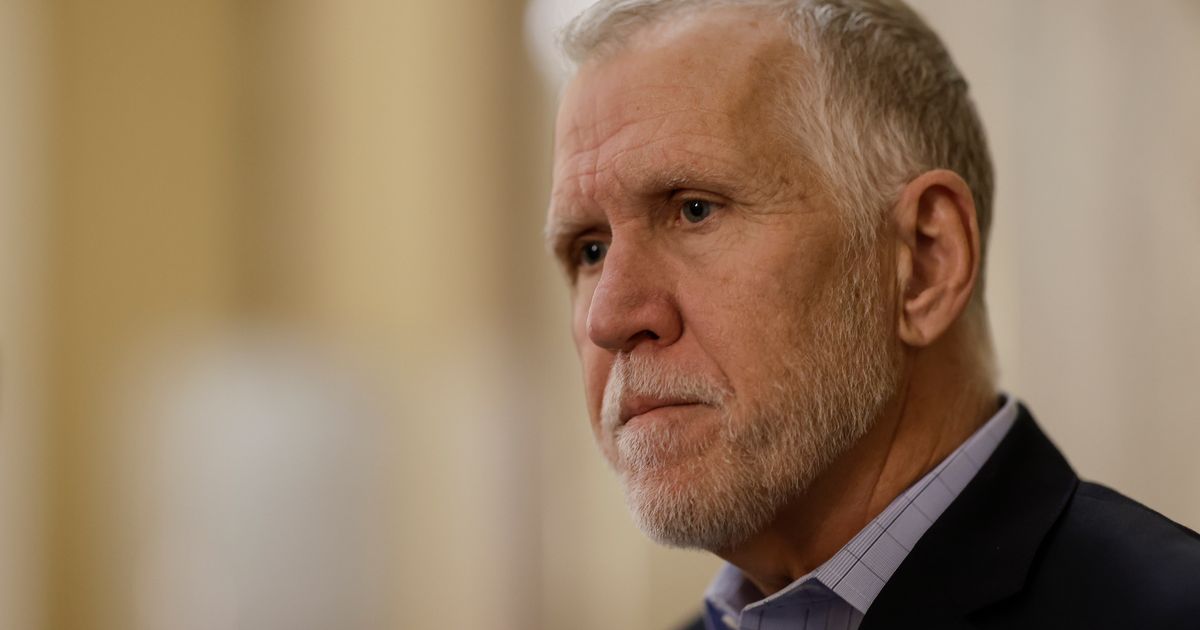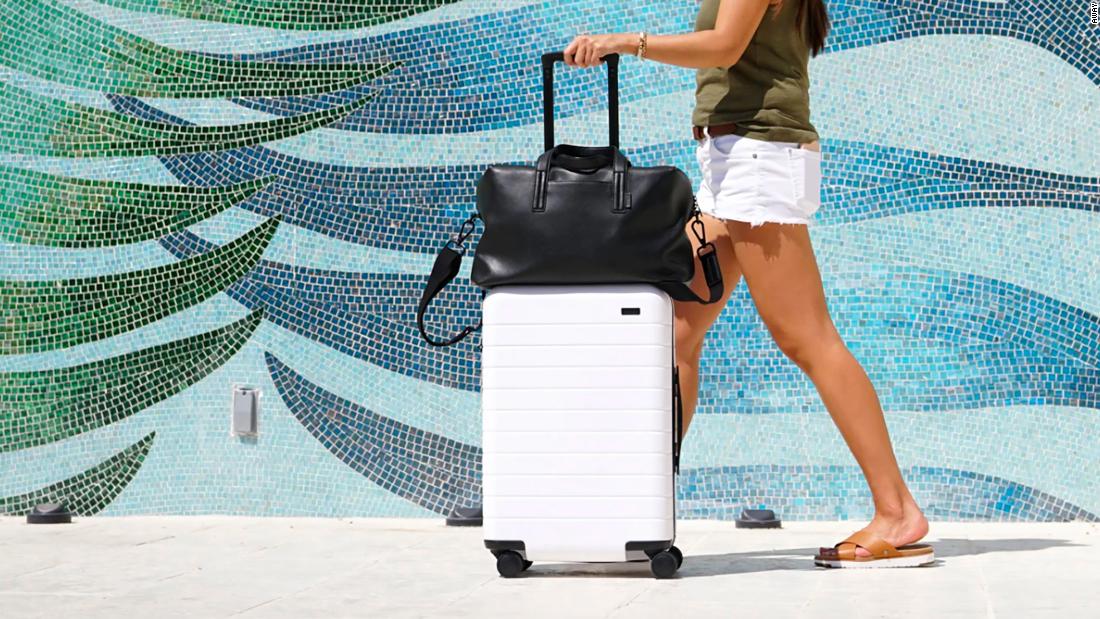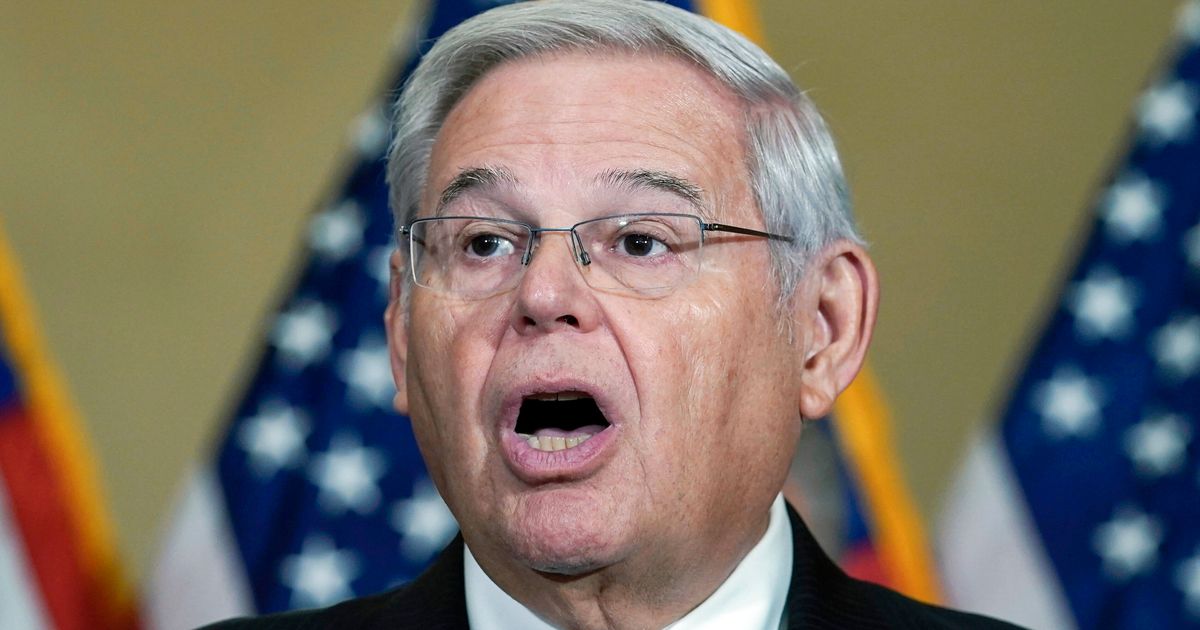Britain’s economic recovery continues as lockdowns end.
Daily Business Briefing
June 11, 2021, 12:49 p.m. ET
June 11, 2021, 12:49 p.m. ET

Britain is emerging strongly from the pandemic, which caused the deepest recession in three centuries last year. The economy grew 2.3 percent in April from the month before, the national statistics agency said on Friday, as lockdown restrictions were partially lifted. It was the third-consecutive month of growth.
The jump was fueled by the pickup in consumer services, including retail, outdoor dining and self-catering vacations, as well as students returning to classrooms. Activity in the personal services sector, such as hairdressing, grew by two-thirds in April.
At the end of April, the British economy was 3.7 percent smaller than it was before the pandemic. It is expected to recover lost output by the end of the year.
The pace of that recovery might change over the next few months, however, because the government is mulling a delay to lifting the last of the social-distancing restrictions. Prime Minister Boris Johnson is set to decide by Monday whether to delay the full reopening on June 21 by four weeks.
The economic impact of a delay “would be minor,” said analysts at Berenberg bank. “Any damage from a later easing after most restrictions have been lifted anyway could be offset afterwards by a confidence effect if vaccines prove to be the game-changer.”
The FTSE 100 in Britain climbed 0.6 percent on Friday.
Elsewhere in markets
-
U.S. stocks drifted higher in early trading on Friday, a day after the S&P 500 returned to record territory.
-
The yield on 10-year Treasury notes edged higher to 1.45 percent, halting a downward trend. Over the past four weeks, the yield has dropped nearly 20 basis points from 1.63 percent and on Thursday, the yield fell six basis points, or 0.06 percentage points, even as data showed inflation in the United States jumped 5 percent in May from a year earlier.
-
Federal Reserve officials have repeatedly said they expect the rise in inflation to be temporary and not a reason for them to imminently pull back monetary stimulus.
-
Most European stock indexes rose. The Stoxx Europe 600 climbed 0.7 percent, led higher by consumer stocks such as the French carmaker Renault and the Danish jewelry maker Pandora, whose share price hit a record high.
Dealing with the fallout from a deadly, destabilizing pandemic left many executives struggling for words. When they tried to describe the challenge to investors, especially during the early days of the outbreak, they often turned to the same descriptor: “unprecedented.”
Company presentations with “unprecedented” mentions
As economies reopen and conditions become more, well, precedented, the chatter among executives, analysts and investors is changing as well, the DealBook newsletter reports. Mentions of “unprecedented” events are less prevalent than they were a year ago and are often references to something in the past.
“We’re now comparing to the unprecedented growth we saw a year ago,” said Jim Jaye of Sherwin-Williams at an investor event this week.

Just as cruises resume after more than a year on pause, the industry is facing an immediate setback.
Two passengers sharing a stateroom aboard the Celebrity Millennium, operated by Royal Caribbean’s Celebrity Cruises from the Caribbean island of St. Maarten, tested positive for the coronavirus on Thursday. The ship, billed as the first fully-vaccinated cruise in North America, has one more day at sea on Friday before returning to St. Maarten to disembark.
All guests will take an antigen test as part of their disembarkation process, said Susan Lomax, the company’s associate vice president for global public relations.
In a statement, the cruise line said that the passengers tested positive during required testing before leaving the ship. The travelers are asymptomatic and are in isolation under observation by a medical team. Testing and contact tracing is in place for close contacts.
The ship’s 650 crew members and 600 or so passengers (including a New York Times reporter) were required to be vaccinated before boarding, and had to show proof of a negative coronavirus test taken within 72 hours before sailing from St. Maarten last Saturday.
Two passengers on a Mediterranean cruise operated by MSC Cruises also tested positive. Both passengers on the MSC Seaside were asymptomatic when they tested positive during routine testing two days ago, the communications manager Paige Rosenthal said. Immediately after testing positive, the two passengers, who were not traveling together, were isolated along with their parties. They all disembarked in Syracuse, Sicily.
All passengers on the vessel were required to take two coronavirus tests before boarding; vaccines were not required.
The major cruise lines are preparing to restart operations from U.S. ports this summer. Celebrity Edge is poised to be the first, sailing out of Fort Lauderdale, Fla., on June 26, with all crew and at least 95 percent of passengers fully vaccinated, in accordance with guidelines issued by the Centers for Disease Control and Prevention.
At the beginning of the pandemic in 2020, cruise ships were sites of some of the largest concentrations of coronavirus cases. The return of cruises and large gatherings such as conferences is a sign that the pandemic is ending in the United States, as the steady pace of vaccinations — 43 percent of Americans are fully vaccinated, and 52 percent have received at least one dose, according to a New York Times database — gives some event organizers the confidence to resume business.
This month, Bitcoin 2021, a business conference dedicated to the digital currency, sold 12,000 tickets and attracted thousands more to Miami for a week of panels, parties, networking and deal making. It was the first major business conference since the pandemic and the largest Bitcoin conference ever.
In the days after the event, several attendees announced on Twitter that they had tested positive for the coronavirus. Others shared stories of their peers testing positive.
Everyone who I hung out with in Miami got covid. Luckily for me I hung out about one feet above everyone
— Larry Cermak (@lawmaster) June 10, 2021
The event attracted Bitcoin enthusiasts from around the world, including some countries that do not yet have easy access to vaccines. Most events took place inside a large, crowded warehouse, and facial coverings were rare. Vaccines were not required to attend.
John Riggins, head of operations at BTC Media, which ran the conference, said that the company had not heard directly from any attendee who tested positive. The company is monitoring the situation and will follow recommendations from the C.D.C., he said.
“Vaccines have been freely available for months in the U.S., to the extent that anyone who wanted to be vaccinated could have been so by the time of the event,” Mr. Riggins wrote in an email.
“We provided all attendees with the current recommendations of the C.D.C. and state of Florida and expressed to our audience that those who were high risk or hadn’t been vaccinated should consider waiting until next year,” he added.
This week, the first major trade show in the United States since the pandemic started, The World of Concrete, is being held at the Las Vegas Convention Center. The event typically draws more than 60,000 industry professionals from around the world.
Didi Chuxing, the Chinese ride-hailing company, made its initial public offering filing public on Thursday, as ride-hailing services begin reviving with the receding of the pandemic.
Founded in Beijing in 2012, Didi began as a taxi-hailing service before expanding into other forms of transportation. In 2015, it merged with another Chinese rival, Kuaidi Dache, to form what became Didi Chuxing.
Didi has since been dominant in China. In 2016, Uber, which had been spending heavily to grow in China, sold its Chinese operations to Didi. (Uber was granted a stake in the resulting company.) Didi now operates in 15 countries, including Brazil and Mexico.
The company’s I.P.O. is likely to be closely scrutinized amid a wave of other technology offerings and as Beijing has begun to rein in domestic tech giants. Didi was valued at $56 billion in 2017 and its investors include SoftBank of Japan and Mubadala, an Abu Dhabi state fund.
Didi’s filing, made under its formal name, Xiaoju Kuaizhi, showed that revenues declined 8 percent to $21.63 billion last year as passenger numbers slid during the pandemic. The company lost $1.6 billion last year, though it reported a profit of $30 million in the first quarter of this year. Like most ride-hailing companies, Didi has historically been unprofitable.
Didi said that an I.P.O. would fund an expansion.
“We aspire to become a truly global technology company,” Didi’s founders, Cheng Wei and Jean Liu, wrote in a letter included with the filing. “What we have learned and built is relevant across the globe — in Latin America, Russia, South Africa or anywhere where affordable, safe and convenient mobility is valuable.”
Other ride-hailing services have reported that business has been recovering. Last month, Uber said revenue for the first three months of the year — excluding the costs of a settlement — was up 8 percent from a year ago, to $3.5 billion. The company lost $108 million.

The Small Business Administration has essentially ousted the leaders of a deeply troubled $16 billion relief effort for live-events businesses, bringing in a new team to take over and fix the program.
More than six weeks after the long-delayed program started taking applications, 14,000 businesses have applied for a Shuttered Venue Operators Grant. Only 90 have been awarded one. Thousands of applicants are tangled in technical glitches and bureaucratic messes, including an error that led to many people being inaccurately declared dead.
The program, which was enacted into law in December to help music clubs, movie theaters and other venues that were forced to shut down because of the pandemic, had been managed by a team from the S.B.A.’s Office of Disaster Assistance, which also oversees the agency’s $200 billion disaster loan effort.
But on Wednesday, the agency told industry groups that it was shifting the program’s leadership to a group of employees from its Office of Capital Access, which coordinated the $800 billion Paycheck Protection Program and the $29 billion Restaurant Revitalization Fund.
On a Thursday morning call with industry groups, Patrick Kelley, associate director of the S.B.A.’s Capital Access Office, said the agency would quickly resolve the mistaken death reports and speed up the review process, according to two participants on the call.
The Small Business Administration is supposed to review and approve applications in tiers, with those who suffered the deepest financial losses helped first, but its deadline for addressing the first tier of applications was Wednesday — and thousands of those applicants are still waiting. Carol Wilkerson, an agency spokeswoman, said those applicants “remain at the front of the line.”
The changes followed repeated pleas for help from lawmakers and industry advocates. “The agency’s rollout and execution of the grant program has been a disaster,” Representative Greg Stanton, an Arizona Democrat, wrote in a letter sent Wednesday to Isabella Casillas Guzman, the S.B.A. administrator.
Seven trade groups also sent a letter on Wednesday asking the S.B.A. to “immediately fully fund” eligible applications. Entertainment venues are “experiencing a talent drain, cannot reopen and are hanging on by a thread because this funding is not arriving quickly enough,” they wrote.
The problem is becoming especially dire for businesses trying to salvage their summer season. Without money from the grant program, many are unable to hire staff, book performers, stock up on supplies and pay overdue bills.
Tracey Tee, the chief executive of Band of Mothers Media, which puts on a women’s comedy tour, got an email from the S.B.A. last week with the same news that has bedeviled thousands of venue owners and producers around the country. “Your name,” the email said, “appears on the Do Not Pay list with the Match Source DMF.”
Translated from bureaucratic jargon, it told Ms. Tee that she was considered dead.
“We are in debt up the wazoo,” Ms. Tee said. “We can’t afford to put shows back on the road because there’s no cash.”
Like virtually all producers, Band of Mothers — which puts on a “moms’ night out” music and comedy event called “The Pump and Dump Show” — was grounded by the pandemic last year, and has had little opportunity for revenue since. At the beginning of 2020, the company employed 13 people — most of them mothers of young children — but has since reduced its staff to two.
After receiving the email, Ms. Tee began a Kafkaesque effort to prove that the government’s information was incorrect. She called the Social Security Administration, which she said was unhelpful. An operator at her local office was friendly but said: “I think you’re being spammed or scammed,” Ms. Tee recalled.
The Small Business Administration has said little about the problem publicly. But in correspondence among applicants, the agency has acknowledged that the problem seemed to be a result of conflicts between employee identification numbers, which apply to businesses and nonprofit groups, and Social Security numbers, which apply to individuals. If a company has the same employee identification number as a dead person, the agency flagged that application as flawed.
Ms. Wilkerson, the S.B.A. spokeswoman, said the agency was working to clear up the problem and move applications forward. Mr. Kelley said on Thursday’s call that applicants should finally see the results of those efforts — and a wave of approvals — next week, according to participants on the call.
Executives received some of the biggest pay packages on record in 2020 as the gap between chief executives and everybody else widened during the pandemic, according to a comprehensive survey of the 200 highest-paid leaders at public companies conducted for The New York Times by Equilar, an executive compensation consulting firm.
Eight of the top-earning executives got compensation last year worth more than $100 million, Peter Eavis reports for The Times. In 2019, only one earned more than that; in 2018, five did.
The gap between the C-suite and the rest grew bigger, too. Chief executives in the survey received 274 times the pay of the median employee at their companies, compared with 245 times in the previous year. And their pay jumped 14.1 percent last year compared with 2019, while median workers got only a 1.9 percent raise.
“While Americans were cheering on the workers who were keeping our economy going, corporate boards were busy coming up with ways to justify pumping up C.E.O. pay,” said Sarah Anderson, global economy director at the Institute for Policy Studies, a progressive think tank.
-
Electronic Arts, the maker of popular video games including the FIFA, Madden, Sims and Medal of Honor series, said Thursday that it was investigating an intrusion into its network that resulted in game source code and tools being stolen. “We’ve already made security improvements and do not expect an impact on our games or our business,” an E.A. spokeswoman said, adding that the company was working with law enforcement officials to investigate. The company said no player data was affected, but confirmed that portions of FIFA and Frostbite source code had been stolen.

Netflix is trying a new way to bring in cash after a quarter in which its explosive growth showed signs of slowing down: Netflix.shop, a site that went live on Thursday.
The site is the next logical step for a company that has become serious about the retail business in the last year and as the field of streamed entertainment becomes increasingly crowded, John Koblin and Sapna Maheshwari report for The New York Times.
Two Netflix anime series, “Eden” and “Yasuke,” were featured in the store on its first day. “Lupin,” the buzzy French crime show about an expert thief, will be front and center at Netflix.shop later this month. In addition to baseball caps, T-shirts, hoodies and sweaters, the “Lupin”-related merchandise will include throw pillows ($60 apiece) and a side table ($150), all of it designed and produced in collaboration with the Louvre museum.
In the coming months, products tied to other Netflix shows, including “Stranger Things” and “Money Heist,” will appear on the online shelves.
The demand seems to be there: Thousands of fan-made products related to the Netflix documentary series “Tiger King,” including candles, face masks and greeting cards, are on sale at Etsy and similar sites, without the company’s blessing.
Unlike the Walt Disney Company, which is estimated to generate tens of billions of dollars in sales each year in merchandise, Netflix has no plans for brick-and-mortar stores in malls or Times Square.
Mark A. Cohen, the director of retail studies and an adjunct professor at Columbia University’s Business School, said he was skeptical about the longevity of the Netflix store after the excitement around its opening fades, in part because of the come-and-go cycle of Netflix hits.
“Most of them have a short shelf-life, unlike a Disney property, which is a generational long ride,” he said.
Today in the On Tech newsletter, Shira Ovide writes that the billion-dollar-plus paychecks of a handful of tech bosses bring up a big and unanswerable question: How do we know if they’re worth the money?

Google must resist pressure from the Russian government to cut off dissenters’ access to YouTube, a top aide to the imprisoned opposition leader Aleksei A. Navalny said this week.
In a meeting with reporters Thursday evening, Leonid Volkov, Mr. Navalny’s chief of staff, said he was in Washington to meet with State Department officials and lawmakers on Capitol Hill ahead of the summit meeting next week between President Biden and President Vladimir V. Putin of Russia.
While some social media, like Twitter, is restricted in Russia, Google and YouTube are widely used by the population to access entertainment, news and sports information. Shutting down access to YouTube would cut off the opposition’s most important platform but it would also annoy Mr. Putin’s base, who want to stream sporting clips, cartoons and music.
But YouTube’s importance to the opposition is growing now that Russian government has designated Mr. Navalny’s group as an extremist organization, forcing it to break up its network of local and regional offices.
“Putin isn’t ready to switch YouTube off in the country,” Mr. Volkov said. “But he is trying to make Google take down videos voluntarily, using fines, using legal pressure, using blackmail. He is only going to increase because of the upcoming elections.”
New laws prohibit posting campaign advertisements online, worrying opposition leaders.
“So this is a big question if Google will actually cave,” Mr. Volkov said.
Mr. Volkov said it was “extremely important” that the opposition continues to have access to YouTube and has asked American government to “reinforce our message” to Google and other Silicon Valley firms.
A spokeswoman for Google did not immediately return a request for comment, nor did the Russian embassy in Washington. A State Department spokesman said only that officials there were aware Mr. Volkov was in the United States, and added that they routinely meet with civil society members.
Google has demonstrated a willingness to stand up to government demands, and not just in authoritarian countries. The company successfully fought a Justice Department subpoena seeking access to the email records of The New York Times reporters.
Other communication and tech companies either chose not to fight the Trump administrations’ request for records or failed to block the move. Phone companies handed over records of Times and Washington Post reporters. Apple gave the Trump administration records of at least two Democrats on the House Intelligence Committee as well as aides and family members in response to a subpoena.
The Russia opposition group is hoping that Mr. Biden not only raises the issue of Mr. Navalny’s imprisonment during his meeting with Mr. Putin, but also directs his administration to take practical steps to increase pressure on Moscow. Mr. Volkov said the opposition movement is skeptical of broad sanctions targeting swathes of the Russian economy. Instead its members want the U.S., Britain and Europe to target Russian oligarchs who hold Mr. Putin’s money for him.
Mr. Volkov works in exile in Lithuania, along with other leaders of the opposition group. But they stay in indirect contact with Mr. Navalny. Mr. Navalny was moved on June 4, his birthday, from a prison medical facility to a penal colony.
“Since that, his condition was stable,” Mr. Volkov said. “We didn’t hear any bad news, which is good news.”
Shared From Source link Breaking News




